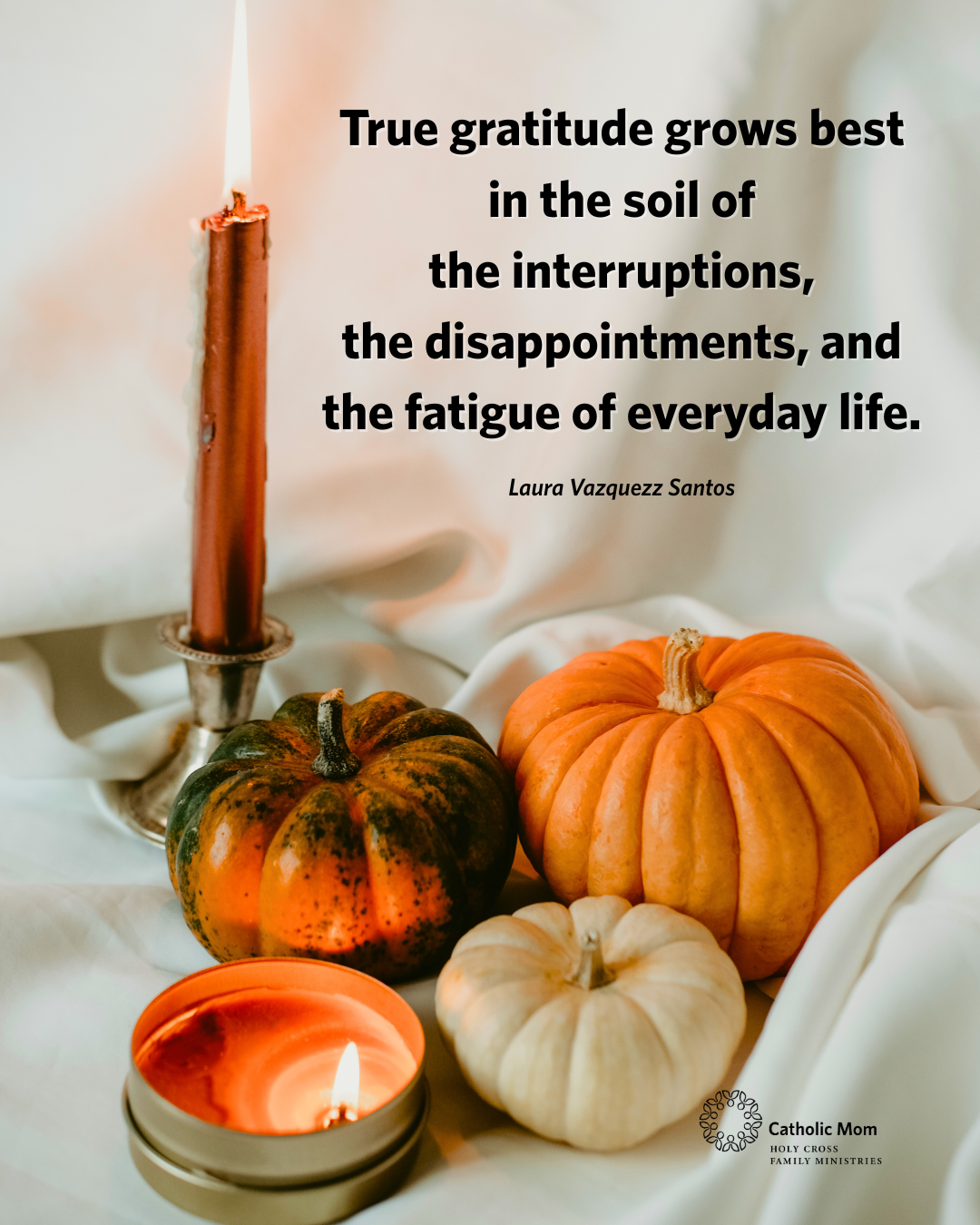
Laura Vazquez Santos shows how cultivating thanksgiving as a form of prayer can anchor a mother’s heart in peace and deepen family faith.
Every October and November, I tell myself this will be the year I’m truly prepared for Thanksgiving holidays; the year I’ll stay calm amid the cooking, the cleaning, the never-ending colds that seem to visit our home like clockwork. Yet somehow, every year, I find myself in the same whirlwind: wiping little noses, juggling work deadlines, eventually having to call in sick, planning meals, and eventually crashing and burning into a state of total exhaustion and dread.
I do try to remind myself (between never-ending loads of laundry) to be thankful. Yet, if I’m honest, each passing flu season tests me a little more, as though for every two steps forward I take, I somehow end up three steps backward.
It’s in these chaotic, unfiltered moments of motherhood that I’ve had to force myself to focus on what gratitude really means. Gratitude, I’ve learned, isn’t a feeling that comes when everything is in order. It is a spiritual discipline that reorients our hearts toward God in the middle of disorder.
Gratitude as Prayer
In the Catholic tradition, thanksgiving isn’t just a polite gesture, rather, it’s a sacred act. The very Eucharist reminds us of sacrifice but also, of “thanksgiving.” Every Mass is a call to remember and give thanks for the mystery of Christ’s love poured out for us. When I meditate on that, I realize that gratitude is not merely something I express; it’s something I enter into.
Some mornings, when the house feels like a battlefield, my prayer is as simple as whispering: “Thank you, Lord, for my children and for this noise, because it means there is life here.” Other days, gratitude is more of a fight: choosing to say “thank You” not because life feels easy, but because I trust that God is at work, even in the mess.
It takes work, precisely because on those days it is hard to transition from a state of despair and exhaustion to a state of gratitude; doing this is an act of the will.
Therefore, gratitude, when practiced intentionally, becomes a form of contemplative prayer, one that doesn’t require perfect silence or an empty schedule, but a surrendered heart.

Growing in Gratitude Within the Chaos
It’s easy to think that gratitude requires serenity, but true gratitude grows best in the soil of the interruptions, the disappointments, and the fatigue of everyday life. St. Thérèse of Lisieux once said, “Everything is grace.” If we can see even our challenges as invitations to grace, then gratitude becomes the lens through which we perceive God’s presence in all things.
When sickness strikes or plans fall apart, we can pause — even for a breath — and ask: “Lord, what are You showing me here? What gift hides behind this moment?”
That shift doesn’t magically erase the frustration, but it does anchor our hearts in trust. Gratitude is a quiet resistance against despair that keeps us grounded in hope when everything feels overwhelming.
Our children often learn gratitude not from what we say, but from what we model. They see it when we stop to thank God before a meal, even when it’s takeout for the third night in a row. And they notice when we thank them sincerely for their help, their patience, or just their presence.
Four Small, Practical Ways to Weave Gratitude In
Our children often learn gratitude not from what we say, but from what we model. They see it when we stop to thank God before a meal, even when it’s takeout for the third night in a row. And they notice when we thank them sincerely for their help, their patience, or just their presence.
Gratitude Candle
Light a candle during dinner and invite each family member to share one thing (no matter how small) they’re thankful for that day.
Thankful Notes
Keep a small basket where everyone can drop short notes of gratitude. On Sunday evenings, read them aloud together.
“Thank You” Walks
Take a short family walk and invite everyone to point out something beautiful or praiseworthy, like the color of the sky, a neighbor’s kindness, or a funny moment from the day.
Bedtime Reflection
Before bed, teach your children to say, “Thank You, Jesus, for…” and fill in the blank with one or two things. It forms a lifelong habit of turning the heart toward God.

Gratitude as a Mother’s Anchor
Motherhood is full of contradictions. There’s joy and exhaustion, laughter and tears, patience and frustration. Gratitude doesn’t ignore those tensions; it holds them gently in God’s light.
When we practice gratitude, we are not minimizing the struggle, we’re magnifying God’s faithfulness within it. In this, gratitude helps us to transform the ordinary, like a sick day, a messy kitchen, or a long commute into sacred ground where God is near.
So as Thanksgiving approaches, let’s remember that gratitude isn’t something we do once a year around a table full of food. It’s the posture of a heart that has learned, through trial and tenderness alike, to say “Thank You, Lord, for it all.”
Because when we choose gratitude, even amid chaos, we discover the quiet miracle of peace and remember the gift of life that has been given to us.
Share your thoughts with the Catholic Mom community! You'll find the comment box below the author's bio and list of recommended articles.
Copyright 2025 Laura Vazquez Santos
Images: Canva
About the Author

Laura Vazquez Santos
Laura Vazquez Santos is a Catholic wife, mom, and legal professional who writes about faith, family, and mindful living. She encourages women to embrace their vocation with courage and joy, drawing from her journey as a mom and small business owner. When not working or writing, she’s chasing toddlers or praying for five quiet minutes. Connect at LVLegalAdmin.com or LinkedIn. Follow her on Instagram at @mrslauravsantos.


.png?width=1806&height=731&name=CatholicMom_hcfm_logo1_pos_871c_2728c%20(002).png)
Comments